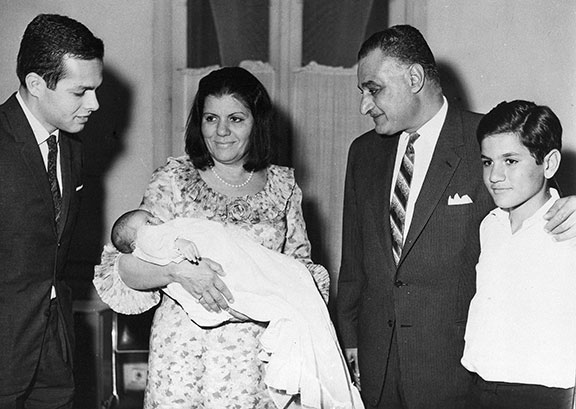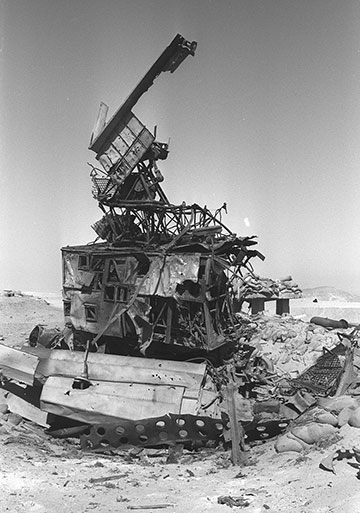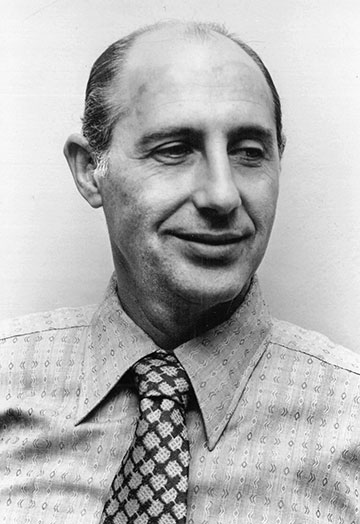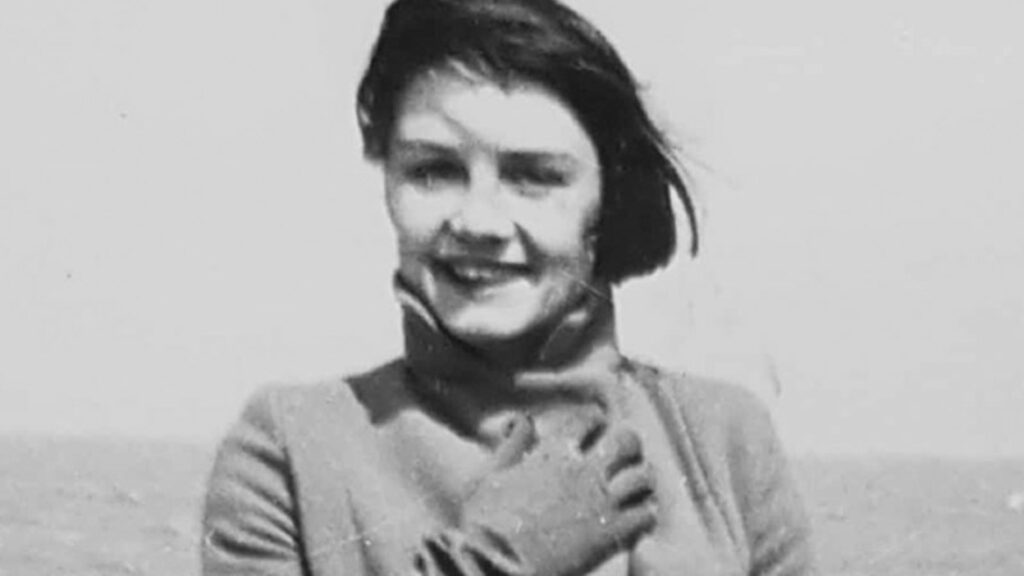Our Kind of Traitor
“I am not a fan of spy thrillers,” Uri Bar-Joseph said recently. “The only good spy novel author is John le Carré.” That gives readers fair warning not to expect exploding wristwatches and car chases from the Haifa University professor and former intelligence analyst’s latest book, The Angel: The Egyptian Spy Who Saved Israel. Even the subtitle might be a bit inflated, he said, since there’s no way of really knowing what the outcome of the Yom Kippur War would have been without the spy code-named The Angel. What Bar-Joseph does offer is a comprehensive account of how a well-placed Egyptian became Israel’s most valuable intelligence asset, and how disagreements between Israeli spymasters over the information he provided ultimately led to his death.
When Bar-Joseph, then a young reserve soldier in the IDF, was called up at 2 p.m. on October 6, 1973, he had no way of knowing that an Egyptian spy’s early warning was what triggered his mobilization. It was only in 1988, when he was asked to serve his reserve duty by writing a study of the Yom Kippur War, that he became aware that some of the intelligence could have come from only a very high-level Egyptian source.

Egypt under Gamal Abdel Nasser was, the Israeli secret agent Wolfgang Lotz once wrote, “like a giant intelligence bazaar,” in which “half the Egyptian civil service and government were infiltrated” by intelligence organizations, both foreign and national, “at one time or another.” But of all the intelligence to come from Israel’s efforts at penetrating its neighbor to the south, the most valuable came from Ashraf Marwan.
Born into a “typical middle-class home in Cairo,” the young Egyptian was a diligent student with a sharp mind that gained him entrée into a position in the “army’s elite academic reserve” and a bachelor’s degree in chemistry. Just as importantly for his future, he was “tall, attractive, and friendly, someone who knew how to get the most out of life.” Those qualities attracted the eye of his future wife Mona, who, according to Bar-Joseph, was neither the smartest nor the prettiest girl at the Heliopolis Sporting Club where they met, but she had something the other girls didn’t: She was President Nasser’s youngest daughter.
When Mona told her father she wished to marry Marwan, Nasser was anything but encouraging. When his chief of staff had the would-be groom investigated, his concerns were not allayed. “The report [Sami] Sharaf sent to Nasser was not flattering. It emphasized Marwan’s ambitiousness and his love for the high life, while doubting the sincerity of his feelings for Mona.” Nonetheless, the couple was given a spectacular wedding in 1966, and Marwan was placed in a low-level job under the hostile eye of Sharaf. Perhaps even more irksome to Marwan were the small civil service salary he was paid and his inability to enrich himself through his new family ties because of Nasser’s high standards of personal integrity.
Restless, Marwan went to England to continue work on his master’s degree in chemistry. His frustrated ego, combined with a gambler’s need for risk, led him to pick up the telephone one day in 1970 and call the Israeli embassy in London to offer his services as a spy. As fortune, and his own political skills, would have it, Marwan became a key aide to Anwar Sadat not long thereafter. He would continue to pass Egyptian secrets to Israel until 1998, long after he had become a wealthy and powerful man.

More than 40 years after the Yom Kippur War, some of its battles rage on, including the debate over Marwan’s true loyalty. In naming his book The Angel, Bar-Joseph firmly plants his flag with the camp that believes Marwan to have been a genuine Israeli asset. Others, as we shall see, continue to disagree, believing him to have been a double agent all along whose misdirection was at least partly responsible for the devastating Israeli losses in the 1973 conflict.
Such suspicions began with Marwan’s first contact with the Israelis. The Mossad, Bar-Joseph writes, “had kept tabs on [Gamal Abdel] Nasser’s son-in-law from the moment he had first arrived in London. They knew he was strapped for cash, even if they didn’t know the details, and they knew he had been forced to return to Egypt,” in disgrace after a wealthy friend paid off his gambling debt, returning to London only to take exams. But the agency believed that despite his money troubles, his closeness to Nasser made it improbable he could ever be turned traitor. Because he was “a ‘walk-in’—someone from the enemy’s side who just shows up one day offering his services,” they remained skeptical. By 1970, the Americans, the British, and the Soviets had all been burned by double agents, but the potential value of a spy placed within the Egyptian president’s family and administration was irresistible. And as Marwan passed information to his case officer Dubi, including items that could be verified against intelligence from other Egyptian sources, the Mossad’s confidence in him swelled.
Bar-Joseph’s decision to identify the spy’s handler only by his first name, noting that his family name is even now withheld by Israel, is illustrative of the still-heated dispute over the Marwan affair. Far from being a secret, Dubi’s last name is reported in The Spy Who Fell to Earth: My Relationship with the Secret Agent Who Rocked the Middle East by Ahron Bregman, an Israeli expat who publicly unmasked Marwan in 2002. Bregman and Bar-Joseph have fought their own running battle over the years. Bar-Joseph castigated Bregman for his part in Marwan’s death in The Angel, originally published in Hebrew in 2011. Bregman’s published reply is a thin, unconvincing attempt at self-exculpation. (One would need a wall of whiteboard to map out all the blame and finger-pointing surrounding Marwan that has played out in the press.)
The argument about who Marwan was actually working for cannot be untangled from the one surrounding Israel’s unpreparedness for the Yom Kippur War and the devastating casualties that resulted. (Relative to population, the roughly 2,500 Israeli soldiers killed during the 20-day conflict would be approximately 250,000 American deaths.) Bar-Joseph’s attempt to write both a mass-market spy story and detailed analysis of a complicated man, with a convoluted life, involved in a complex chain of events, results in a somewhat uneven book. The story is a sprawling one with an extensive cast of characters, and the former analyst’s thorough explanations bog down in places. Readers would do well to keep their eye on two men throughout the book: Eli Zeira, head of military intelligence in 1973, and then–Mossad chief Zvi Zamir.
In July 1972, Anwar Sadat expelled the Soviet troops who had been stationed in Egypt since 1970. The move came after the Soviets failed to deliver weapons systems Sadat felt he needed to take back the Sinai. Based largely on information from Marwan, by then Sadat’s emissary for special affairs, the Israelis had developed what they called the konzeptzia (the concept), an intelligence paradigm that held that Egypt would not launch a war without “weapons of deterrence,” primarily anti-aircraft batteries and missiles capable of hitting Israeli cities. But by the fall, plans were coming together to partner with Syria and engage in a limited war to take back only the eastern bank of the Suez Canal. Marwan passed along information on the developing war plans to Dubi. The paradigm had changed, but not everyone in Israel felt the shift:
[Zeira] estimated that . . . the likelihood that Egypt would actually try to cross the Suez Canal [was] “close to zero.” At the core of Zeira’s error stood a misunderstanding of Sadat’s expulsion of the Soviet troops just a few months earlier: Instead of seeing it as a preparation for war, he took it as a dramatic setback to Egypt’s defensive capability.

Zeira and his organization continued its allegiance to the konzeptzia despite Marwan’s warnings as well as data from other sources showing that the paradigm no longer applied, and Nasser had other concepts in mind. When Egypt pushed out the date Marwan had initially passed on for the attack, Zeira used that to discount all the information, rather than seeing changes in plans as an inevitable feature of war planning. Fortunately for Israel, IDF Chief of Staff David Elazar thought the chance of war was “low but not low enough to ignore,” and fought plans to cut back the IDF’s budget, “tooth and nail,” with teeth sharpened by Marwan’s warnings. The traumatic encounter between Israel and allies Syria and Egypt that began on Yom Kippur in 1973 could have been much bloodier than it was.
Zeira’s mistakes led the Agranat Commission, which was tasked with investigating the IDF’s failures, to recommend that he be dismissed from his post. He resigned but he was never able to accept the blame heaped on him. He maintained that Marwan was a double agent whose early false warnings had lulled Israel into complacency when they didn’t pan out. This was in marked contrast to Mossad Chief Zamir, who once faced down a direct order from Golda Meir to pass information to the Americans because he feared it would expose Marwan.
After years of coy hinting that led to the outing of Marwan by Bregman and other writers, Zeira finally named Marwan on an Israeli television show and claimed that he was a double agent in 2004. A week later on the same program, his old rival Zamir said Zeira must “stand trial for having revealed sources . . . when he reveals a source, he breaks the first of the Ten Commandments of the Intelligence Corps.” Zeira sued Zamir for libel and lost; attempts to have Zeira charged were stymied. None of that mattered to Ashraf Marwan: Three weeks after Zamir was cleared of having slandered Zeira—the truth being an absolute defense—Marwan was dead from a fall from his fourth-floor balcony in London on June 27, 2007.
After an investigation, Scotland Yard could not, or would not, label Marwan’s death either suicide or murder. Nor did investigators weigh in on the possible murderers: angry business rivals, the Israelis, or the Egyptians. Almost 10 years later, the evidence remains only circumstantial, though Bar-Joseph appears fairly certain it was the Egyptians, who could no longer deny that Nasser’s son-in-law and Sadat’s top-level aide had been a traitor.
“The Angel” was given a hero’s funeral in Cairo. President Mubarak, who was abroad, released a statement calling Marwan a “true patriot of his country.” The president’s son and heir apparent, Gamal Mubarak, comforted his widow and their two sons at the funeral.
Comments
You must log in to comment Log In
Suggested Reading
Letters, Winter 2021
Et Tu, Jewish Review?, The Akedah Conundrum, Crazy Rich Mizrachim?, Josephus’s Jonah, and More

Kidnapped!
When Ruth Blau met with Khomeini to secure the safety of Iranian Jews, it was only the latest extraordinary meeting for the fifty-seven year old Resistance spy turned convert turned kidnapper turned anti-Zionist turned Israeli agent.
I Believe: A Poem
Please remember, contestants, to phrase your answer in the form of a question. —Alex Trebek, host of Jeopardy!™ I believe with a perfect faith in the coming of the messiah, though he may tarry. —Late medieval reformulation of Maimonides’ 12th Principle of Faith, Commentary to the Mishna, Sanhedrin, Perek Helek. In the days of the Messiah, each individual will…

From Pittsburgh to the Holocaust
Journalist Mark Oppenheimer visited Pittsburgh thirty-two times and conducted 250 interviews to get the story of the Tree of Life massacre right. “Years from now,” Jonathan Sarna writes, “when people want to know what happened … this is the book to which they will probably turn.”
yosumiru17
Great article!